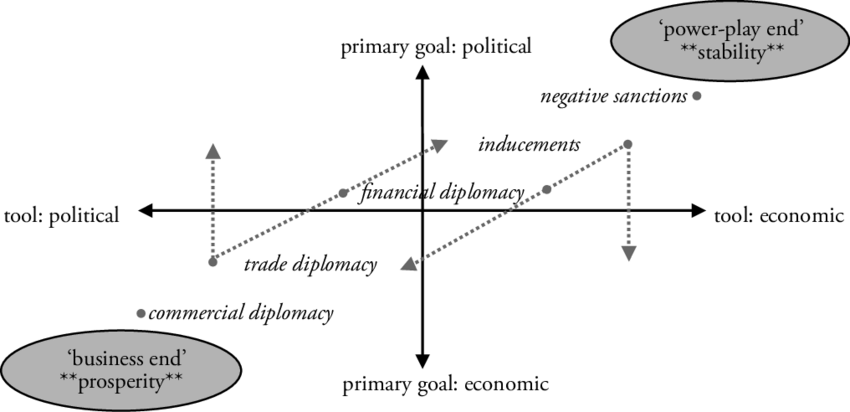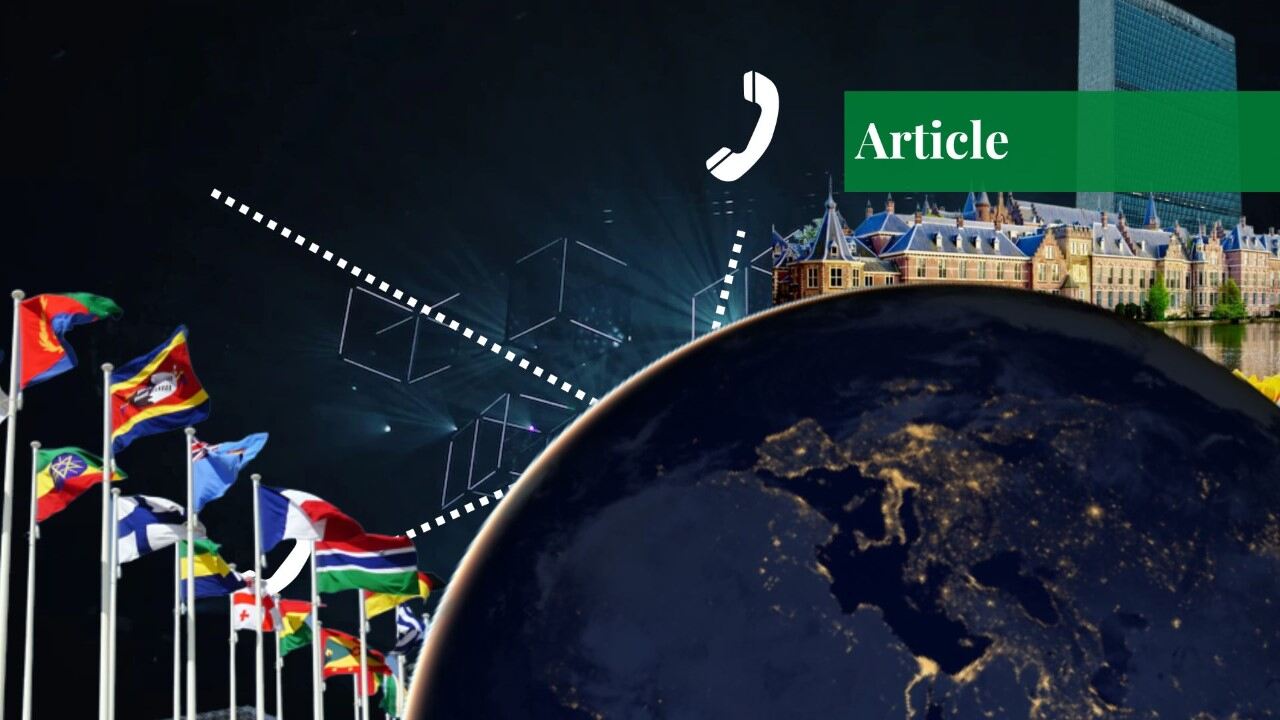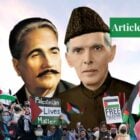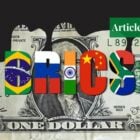Ms Duaa Ayaz is a graduate of Economics and Social Sciences. She is currently working as a freelance writer on Fiverr. Her sphere of interest includes international relations, geopolitics, foreign policy, security, and socio-economic issues of Pakistan and the world.
Conceptualising Economic Diplomacy and Its evolution
Political scientist Richard Feinberg conceptualises economic diplomacy as “the use of economic instruments to advance foreign policy goals,” while international relations scholar John Ikenberry views economic diplomacy as “the use of economic statecraft to achieve foreign policy objectives.” Economic diplomacy is also explained as the “use of economic means to achieve political ends”.
Furthermore, scholars Lee and Hocking consider economic diplomacy as a “pursuit of economic security within an anarchic system”. However, a comprehensive definition is provided by political scientist David Baldwin, author of the book ‘Economic Statecraft’, who defines economic diplomacy as the use of economic instruments such as trade agreements, sanctions, foreign aid (inducements), and investment promotion as a means to attain foreign policy goals.
Given the dynamic and polarised nature of the global arena, economic diplomacy is viewed from a lens of axial ends – the ‘power-play end’ and the ‘business end’. The tools of economic diplomacy lie somewhere betwixt the two extremes. The significant tools (commercial diplomacy, trade diplomacy, financial diplomacy, inducements, sanctions) of economic diplomacy are captured in the figure below:

Concerning the evolution of economic diplomacy, its history dates back to Greek literature. Chronicling the history of the Peloponnesian War, Thucydides references the use of trade boycotts (sanctions) by Athens as a coercive measure against the Spartans. However, as a field of academic research, economic diplomacy emerged in the 1990s and is founded upon the triangular framework constituting three angles/subject areas—international relations, international political economy, and economics—converging at the core of the triangle that depicts a balance of interests.
Hence conceptually, economic diplomacy can be defined as the “use of political means as leverage in international negotiations, with the aim of enhancing national economic prosperity, and the use of economic leverage to increase the political stability of the nation”. Generally, economic diplomacy is pursued by states keeping three core confronting challenges in mind—the tension between politics and economics, the tension between international and domestic pressures, and the tension between state and non-state actors.
Significance of Economic Diplomacy in the 21st Century
“Economic diplomacy is the new frontier of international relations, and it is more necessary than ever in today’s interconnected world.” – Robert Zoellick, Former President of the World Bank
In their seminal work “The New Economic Diplomacy: Decision-making and Negotiation in International Economic Relations”, Bayne and Woolcock argued that economic diplomacy is gaining prominence in the 21st century by virtue of the advent of globalisation and interdependence, the rise of developing economies such as China and India, and the burgeoning influence of non-state actors such as private business and civil society. Additionally, non-traditional security threats in the 21st century have also opened channels of multilateral engagement among states through Economic Diplomacy.
The Advent of Globalisation and the Liberal World Order
With the increasing interconnectedness of the global economy, countries have become more dependent on each other for trade and investment. This has led to the growing importance of economic diplomacy in managing these relationships. Economic diplomacy has become more significant as states seek to protect and promote their economic interests in an increasingly competitive global market.
Globalization has prompted the creation of the World Trade Organization (WTO) which has expanded the role of economic diplomacy in resolving trade disputes and negotiating new trade deals. In a globalised world, economic diplomacy is also used to attract foreign investment and promote mutual economic development. For example, a state may offer tax incentives or other financial benefits to attract foreign investors.
In today’s world driven by consumerism and interconnected global markets, the use of economic diplomacy as a foreign policy instrument is highly germane. Globalization has expedited the growth of Export credit agencies (ECAs) which provide a variety of services such as providing finance, insurance, and guarantees to support the export of domestic goods or services to overseas markets.
In a liberal world order, economic diplomacy operates in global governance institutions such as G20, G7, IMF, World Bank, and regional organizations to influence international economic policies and regulations. All these elements play an important role in managing the increasing interconnectedness and interdependence of the global economy.
Rise of Emerging Economies
The rise of emerging economies such as China, India, and Brazil has led to a shift in the global economic balance of power from the West to the East. This has made economic diplomacy notable as states seek to maintain or improve their economic relationships with these rising powers for these states provide a consumer market pool as well as economic engagement avenues.
The governments of these emerging economies are using economic diplomacy as a tool to cement their position in a highly viscous international system dominated by power politics and multi-lateral institutions.
The Influence of Non-State Actors
Transnational/supranational actors such as IGOs (WTO, IMF), NGOs (civil societies), MNCs, etcetera have become key players in international relations and foreign policy. They actively engage in economic diplomacy, either by influencing government policies or as independent players. The increasing role of non-state actors has resulted in a cob-web model of a world characterised by complex economic interdependence.
Digitalization of the Economy and Development of New Technology
The rapid digitalization of the global economy and the development of new technologies has made economic diplomacy a crucial foreign policy tool of the 21st century. Digital media, e-commerce, cryptocurrencies, and the various digital avenues are influencing international trade in today’s globalised world order.
Economic Diplomacy is being used by actors to negotiate agreements on digital trade as countries look to create a framework for cross-border digital trade that ensures fair competition and protects the rights of consumers and businesses. For example, the United States, Mexico, and Canada Agreement (USMCA) (a trilateral agreement) constitutes a digital trade chapter that aims to facilitate cross-border data flows and prevent data localization requirements.
Next, economic diplomacy is also being used to work out agreements on data privacy, in a bid to protect the personal data of their citizens and allow for the free flow of data across borders. A case in point is the Trans-Atlantic Data Privacy Framework (previously EU-US Privacy Shield) that has been established between the European Union and the United States to allow the transfer of personal data from the EU to the US while ensuring that the data is protected by EU standards.
Through economic diplomacy, states also pursue agreements on intellectual property. For example, the Comprehensive and Progressive Agreement for Trans-Pacific Partnership (CPTPP), also known as TPP11 or TPP-11, is a trade agreement that has a chapter on intellectual property that aims to provide a high level of protection and enforcement of intellectual property rights.
Economic diplomacy also deals with cybersecurity in the digitalized world. Economic sanctions and embargos are used to pressure countries that engage in cyber espionage or cyberattacks on other countries. For instance, the US had imposed sanctions on Russian and Chinese companies and individuals for their involvement in cyber espionage activities.
Economic diplomacy also deals with the regulation of artificial intelligence. The report ‘G20.AI: National strategies, Global ambitions‘ demonstrates the application of economic diplomacy by G20 states to establish principles concerning the use and regulation of AI.
Non-traditional Security Threats
A multi-lateral engagement of states in mitigating global threats has expanded the role of economic diplomacy in rewarding or punishing states that abide by or violate international laws and treaties respectively. For instance, Iran had to incur nuclear sanctions due to the alleged violation of the UN resolution that demanded Iran halt its uranium enrichment program. However, Iran’s cooperation with P5+1 under the Joint Comprehensive Plan of Action (JCPOA) resulted in the lifting of the nuclear sanctions.
Economic diplomacy also uses foreign aid as economic leverage to incentivize other countries to adopt policies that align with a country’s foreign policy goals. For instance, the US provided aid and assistance to Pakistan via the coalition support fund in exchange for Pakistan’s active participation in combating terrorism.
Jeffrey Sachs, Director of the Earth Institute at Columbia University, states the importance of economic diplomacy in addressing non-traditional security threats and global challenges such as poverty, inequality, and climate change in a globally interconnected world.
Case Studies
China’s Ambitious BRI project
“China is a sleeping giant. Let her lie and sleep; for when she awakens, she will astonish the world”
This perfectly epitomises China’s glorious journey from a nascent consumer market to the economic juggernaut of the 21st century. China was capable of achieving this feat through its soft power approach bolstered by economic diplomacy.
Today, China’s foreign policy thrives on a geo-economic strategy that is embedded in the historical trends of globalization and the neoliberal order, evinced by its ambitious Belt and Road initiative (BRI) that seeks to connect vast swathes of the globe through economic diplomacy encompassing trade promotion, investments, partnership, and commercial connectivity.
Through the BRI, neo-liberals opine that China aims to achieve absolute gains and win-win cooperation fostering socio-economic progress. As per the World Bank report on BRI (2018), the trade and tariff agreements associated with BRI state a 50% tariff reduction on transactions thus ensuring swift border transactions and fewer border delays.
US-Russia Relations amidst the Russia-Ukraine Conflict
Conflicts and bloc politics go hand in hand in a world order where states tend to secure their best interests. To pressurise Russia, the US, an ally of Ukraine in the conflict, imposed trade controls and sanctions on Russia. Amidst the crisis, the US ban on diamond imports from Russia is a case in point of the application of economic diplomacy by the US.
From Development Aid to Developmental Partnership with Pakistan
Pakistan’s dwindling economic security has rendered it necessary for the state to pivot its foreign policy from geo-politics to geo-economics. The geo-economic foreign policy encapsulates economic diplomacy, new terms of engagement, regional economic integration, infrastructural development, and connectivity.
In this facet, Dr Moeed Yusuf, former national security advisor to the prime minister, opined that the future of Pakistan lies in economic diplomacy and outreach to the world.
Analysing Pak-US relations, he advocates for developmental partnership, putting emphasis on Pakistan’s stance of ‘trade, not aid’-based relationship with the US. “Our dream for Pakistan is to become the melting pot for global economic interests. We are not in favour of providing military bases anymore, but ready to provide economic bases to the world to use Pakistan as a hub of interdependences.”, he added.
Challenges Ahead
A world that’s in constant flux necessitates adaptation at all levels. Although economic diplomacy is a sought-after tool of foreign policy, global power games, increasing complexities of the global economy due to complications arising from rapid digitalization, rising anti-globalisation sentiment, unilateralism, and growing protectionist regimes may hinder its flexibility.
The global economy is a complex and dynamic system, making it challenging to predict the effects of economic measures on other states and on the global economy as a whole. Furthermore, both digitalization and globalization have changed the landscape of traditional economics, paving way for the digital service sector such as e-commerce and e-trade. However, that would be a challenge as free trade agreements (FTAs) for the digital service economy will have to encompass a common set of standards and regulations.
In a world driven by bloc politics, engaging in FTAs would be difficult due to variations of legal and regulatory standards among states. In such a scenario, states having common standards would form blocs having a common FTA regime which would differ from the standards of the other blocs giving rise to a disintegrated global trading system, hence hindering the prospects of economic diplomacy.
Trade in Services Agreement (TiSA) established in 2013 failed as all states weren’t ready to negotiate at the table. Hence in a digitalized world, it is harder to regulate digital trade and data privacy. The withdrawal of the United States from the Trans-Pacific Partnership (TPP) and the Paris Agreement, and the renegotiation of the North American Free Trade Agreement (NAFTA) illustrate this trend.
Future of Economic Diplomacy
“Economic Diplomacy should be a central feature of foreign policy” – Henry Kissinger
Despite numerous challenges, economic diplomacy is the present and future of Diplomacy. However, in order to be effective, it will require careful consideration of the potential consequences of economic measures and the need for cooperation among countries. Its future will depend on the ability of states to adapt to the changing global landscape.
In the future, regional approaches will be gaining ground due to the ineffectiveness of the multilateral system as regional cooperation generally involves engagement with states at similar levels of development and policy preferences. A recent example is the Trans-Pacific Partnership (TPP) and the Regional Comprehensive Economic Partnership (RCEP).
Furthermore, new regional deals are also speculated between regions having the largest economies, notably the EU’s agreements with Japan and Canada and its Transatlantic Trade and Investment Partnership (TTIP) with the United States. It is also expected that states will engage in a ‘plurilateral’ level of economic diplomacy. Plurilateral bodies such as the Organization of Economic Cooperation and Development (OECD), and the G8 and G20 summits the Commonwealth would serve as forums where like-minded national governments would form agreements on domestic and international economic objectives.
In a nutshell, economic diplomacy is essential in today’s interconnected world, where economic relations are a driving force in shaping international politics.
If you want to submit your articles and/or research papers, please check the Submissions page.
The views and opinions expressed in this article/paper are the author’s own and do not necessarily reflect the editorial position of Paradigm Shift.



















